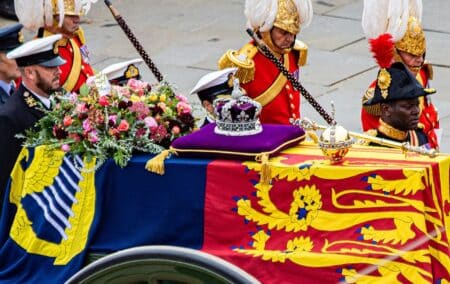‘You’re bloody nuts!’ my wife remarks, seeing me wearing a black arm band.
While her colourful diagnosis of my mental state is probably not far off the mark, I felt that there was more to unpack with regards to my admiration of the late Queen and my general sympathy for the British monarchy.
I am not the only Anglo South African – a term I have stolen from historian Graham Viney – to mourn the passing of Her Majesty, and nor am I unique in my sympathy for the Royal Family.
How many English-speaking South African families still have a plate or mug commemorating a royal wedding, visit or coronation? How many English-speaking South Africans delighted in the pomp and grandeur of recent royal weddings? I see that Hello Magazine is sold by Exclusive Books and Woollies; there must be a market for this royalist tabloid beyond myself and a few little old white ladies.
After some soul search and having read Graham Viney’s fantastic book, The Last Hurrah: The 1947 Royal Tour of Southern Africa and the End of Empire, I thinkI have come some way in decoding the Anglo South African’s continued interest in the British Crown.
Firstly, my own sentiments and those of a significant portion of my tribe must be ascribed to the late Queen Elizabeth herself. The Queen’s charisma and dedication have been awe-inspiring. For more than 70 years, the Queen (and other members of her ‘firm’) have been the most significant actors in continued British prestige.
Cultural dominance
Although Britain no longer has her Empire, she still manages to punch above her economic weight, and it could be argued that Britain’s Empire has partly been preserved in her cultural dominance. Think high tea, Harry Potter, Downton Abbey, Lord’s Cricket Ground, and so on. The royal family and their dedication to charity work, diplomacy and ceremonial splendour have been essential elements in the maintenance of British power and influence.
This is definitely a source of admiration, but not a particularly Anglo South African one.
The next source of our affection (or affliction you might argue) is our fragile identity. Tribalism, whilst often denounced as a disease best avoided, is an essential component in human nature. To want to feel secure in who you are and to share in a communal affiliation is a near-universal desire.
In South Africa, home to many rich cultures, the English citizen feels insecure. Surrounded by mighty cultures like those of the Zulu, the Xhosa and the Afrikaner, the Anglo South African needs something to rally behind, something to distinguish ‘us’ from ‘them’.
That sought-after Britishness
The late Queen and the royals were held up as physical representatives of that sought-after Britishness. They represented the real and unadulterated version of British culture. Anglo South Africans held their manners, dress, etiquette, etc to be proper (pukka) and worthy of mimicry.
As the years passed and other reminders of Anglo South African culture (war memorials, town halls, municipal gardens, etc) began to waste away through active republicanism and neglect, the royals remained as a steadfast reminder of who we thought we were.
Lastly and most importantly, I feel, our fondness for the royals flows from a mythical nostalgia that we have created involving them.
The Queen and the monarchy represented a glorious Anglo South African past that in truth never existed. It was a time when we were in power, when we ruled South Africa in an effective, just and increasingly liberal manner. The South Africa of this beautiful fairytale was ordered (the police uniform was identical to that of the London Bobby), clean and beautiful.
Photographs of the Royal Tour to South Africa in 1947 are held up as evidence of this utopia: the buildings designed by Sir Herbert Baker and co, the streets swept and the gardens meticulously maintained. The railways were laid across the country and the trains, with their teak and leather interiors, ran on time.
Eliminating Apartheid
Our men went overseas to fight militarism and fascism in two World Wars and if the United Party had won the 1948 election, the franchise would have slowly been extended to more and more South Africans of colour – eliminating Apartheid in the womb.
We convince ourselves that this would have been the case, citing the Queen’s granting of a knighthood to anti-Apartheid parliamentarian Helen Suzman, the Queen’s warm relationship with Mandela and her visit to post-Apartheid South Africa in 1995.
So, while I wear the ‘nutty armband’ to mourn the death of a great woman, I also wear it to mourn a further whittling away of my identity and the creeping cognizance of an inherited nostalgia for a mythical African Eden that never really existed.
The views of the writer are not necessarily the views of the Daily Friend or the IRR
If you like what you have just read, support the Daily Friend

